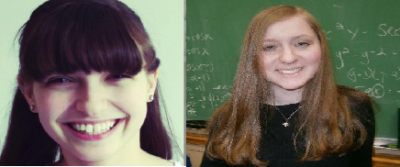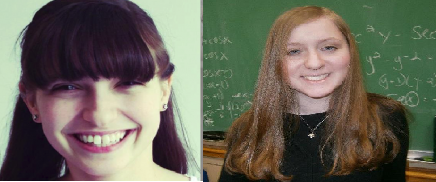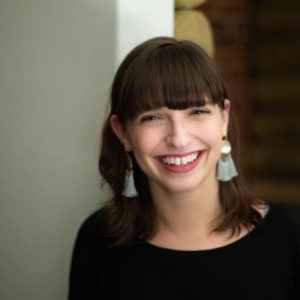
AVIGAYIL HALPERN: When I was fourteen and just beginning to explore what it would mean to me to be a halakhic, or Jewish-law-abiding, Jewish feminist, I was delighted to stumble across a blog called Star of Davida. The blog’s author, who went by the name “Talia bat Pessi,” explored her own beliefs and experiences as a teenage Orthodox feminist. For a long time, I followed this blog without personally knowing the author, though I followed her work and idolized her from afar. Eventually, however, our social circles overlapped, and we began a friendship. Talia is now a sophomore at Harvard and a close friend of mine, and over time, both our views about Jewish feminism have evolved and changed, and I’m delighted to be able to now discuss the evolution of our views with her:
Talia, when I first discovered your blog, by far the most exciting thing I read was your post about the Shema, from 2011. In it, you say that “Once I graduate and get to college… I’m looking forward to wearing tefillin and tzitzit.” When I read that initially, I was on the fence about those mitzvot; now, I’m an activist for women’s tefillin-and-tzitzit wearing, and, though you’re supportive, you haven’t adopted those practices. What changed as you matured?
TALIA WEISBERG: Avigayil, when I first found you through a comment on my blog, it was so exciting to e-meet another observant teenage feminist! I still can’t believe that anything I wrote could have had such an impact on a person. When I wrote that post in 2011, I had full intention to wear tefillin and tzitzit once I left my mother’s home and had complete autonomy over my own religious choices. But, as you said, it’s been a year and a half, and I still haven’t engaged in either of those practices. I’ll admit that part of it is inertia; nobody’s forcing me to lay tefillin, and it’s not a convenient mitzvah to do—I’d have to obtain a set, learn how to properly put them on, and actually wake up in the mornings to do it. However, I do like to think that it’s not just laziness, and that I am making an active choice not to lay tefillin at this point. As much as I rebelled against the right-wing mentality that my ultra-Orthodox Bais Yaakov high school promoted, I do see the appeal of being part of that community and I’ve decided that it’s where I want to be. Because tefillin and tzitzit wearing are not accepted in this community, I don’t do it.
AVIGAYIL: So, part of the drive behind my being so public about my tefillin and tzitzit is that they ARE ideological choices, feminist ones. I’ll be frank when I say that while I respect, admire, and love you, it really bothers me that you’re choosing to affiliate with a community whose values so strongly contradict some of mine. Being in Israel, the differences between halakhically observant Jews are something I think about frequently; a few months ago, I was in the ultra-Orthodox Jerusalem neighborhood of Har Nof for Shabbat, and walking around, I did feel a certain joy and appreciation for being somewhere where the entire community was a place where I knew there would be food that met my standards of kashrut, Shabbat norms would be consistent, etc. However, I also felt really uncomfortable and unsafe in my visible tzitzit. Ultimately, I’m not willing to trade my feminist beliefs for my halakhic ones; it will be hard, but I intend to seek out communities where I can demand both. For me, praying at a shul that uses musical instruments during prayer on Shabbat and praying at a shul that does not count women in a minyan are similar and parallel departures from my values.
TALIA: I have similar levels of respect, admiration, and love for you too, and it really pains me that the community where I feel comfortable is not a community that welcomes everyone. In all honesty, it doesn’t really welcome me, either; choosing to pursue a degree at a secular college and a professional career largely invalidates me as a potential member, but because I don’t have a physical identifier like tzitzit that makes me Other, I can pass. It does frustrate me that I only feel truly religiously authentic in places like that, where I know that my feminist leanings and feminist friends are not accepted. But what can I say? When I was in Har Nof for Shabbat this past summer, it just felt right. I felt like that was where I belonged, even though I know that I really don’t. I like to think that by being in this community, I can effect change from the inside and create a more hospitable climate for feminism and general tolerance of outsiders.
I think you’ve basically figured out where you stand Jewishly and where you want to go in life, but I’m not quite there yet. I still need to find my balance between frumkeit and feminism, and decide if I really can be part of a community like the one in Har Nof. I wish that I wouldn’t have to trade my feminist beliefs for my halakhic ones, but I lack the confidence that you have that I’ll find a place where I can have both; I really don’t think I can have it all.
AVIGAYIL: So, clearly finding a community is a huge point of tension for both of us. I think we differ in two ways: firstly, I do believe that I can find a community that meets my standards of both halakha and egalitarianism. These communities, while small, exist and are growing. Secondly, I don’t think that if for some reason I end up unable to live in such a community that I’ll be need to sacrifice my ideals; I am firmly convinced that I could create a halakhic egalitarian family even in a place where there is not an established community. This might take the form of belonging to a Conservative synagogue where my children are the only ones who will only eat foods with kosher labels and don’t drive to shul, and an Orthodox school where my daughters would be the only ones in tzitzit, or some other combination of affiliations. This is not my ideal, but it would work — “having it all” is achievable if one doesn’t define “all” as having exactly their ideal institutions at all times.
I think it’s interesting that our discussion has boiled down to issues of community; are existing communities the primary factor that should be influencing the way we choose to live our current religious lives?
TALIA: In an ideal world, I would say no, communities should not be the primary influence. However, where we live and who we live next door to dictate the types of schools we send our children to, the types of shuls we affiliate with, the overall Jewish education and experience that we provide for ourselves and our families. So at the end of the day, a lot of what we do is communally influenced, whether we like it or not. Of course it’s possible to happily live at the hashkafic (philosophical) edges of a community, and I think I’ll always have to do so, as I’m probably one of the few whose main consideration for wearing tzitzit is whether or not the garment will cover my collarbone. I suppose it’ll all work out eventually, that I just need to let my life take its course and things will figure themselves out.
And anyways, no matter where the two of us end up, I know we’ll dress our babies in matching feminist onesies.
Avigayil Halpern is a student at Midreshet Ein Hanatziv in Israel and will be starting at Yale University in the fall.
Talia Weisberg is a student at Harvard University.

